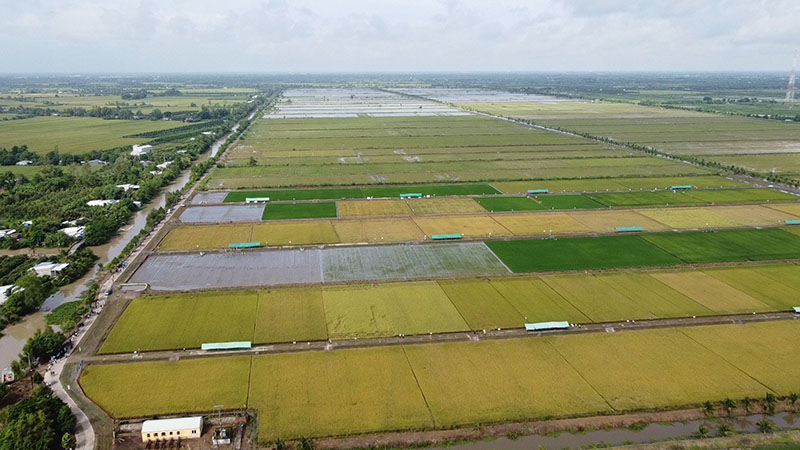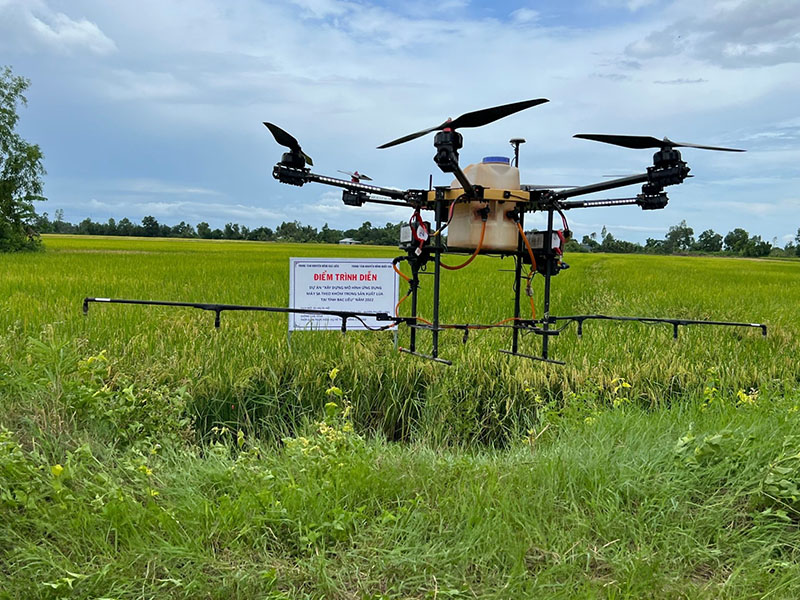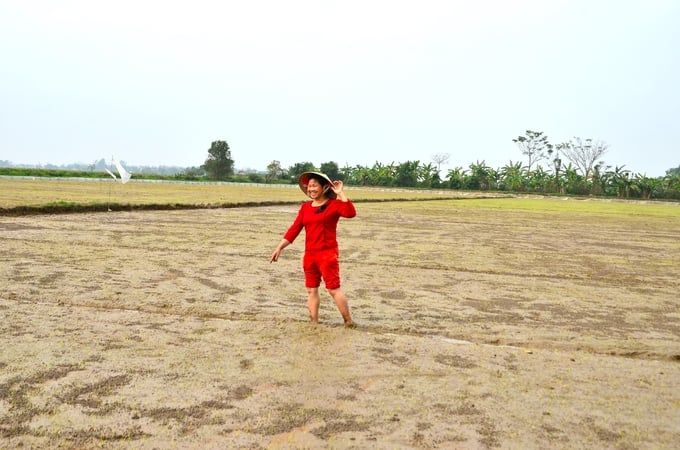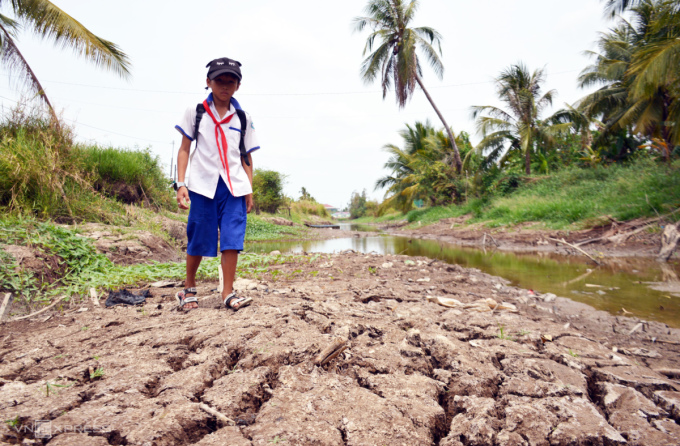Life-changing opportunity for millions of farmers in the Mekong Delta
Bringing Vietnamese rice brands to integrate and thrive in the international market
According to Deputy Minister of Agriculture and Rural Development Tran Thanh Nam, implementing the Project, the Ministry has announced a high-quality and low-emission rice cultivation process recognized by scientists and international organizations. recognized, currently deploying 5 points as pilot models for high-quality and low-emission rice production, training people to understand the process of high-quality, low-emission rice production; contributing to the sustainable development of the rice industry in the Mekong Delta, helping the Vietnamese rice brand thrive and integrate sustainably in the international market.
Currently, the Ministry of Agriculture and Rural Development has selected 5 provinces and cities in the Mekong Delta region to pilot the Project, including: Dong Thap, Tra Vinh, Soc Trang, Kien Giang and City. Can Tho, meets 4 criteria as prescribed in section IV, Article 1 of Decision No. 1490/QD-TTg, dated November 27, 2023 of the Prime Minister on: Criteria for planning and infrastructure; Criteria for sustainable farming and green growth; Criteria for production organization and Criteria for enterprises participating in linkages.
 |
|
It is necessary to increase investment in synchronous infrastructure for the 1 million hectares of high-quality, low-emission rice project With the main goal: organize the implementation of the Project in the province with high efficiency; Forming areas specializing in high-quality and low-emission rice cultivation associated with reorganizing the production system along the value chain, applying sustainable farming processes to increase value, contributing to sustainable development of the industry rice, improving production and business efficiency, income and life of rice growers, protecting the environment, adapting to climate change and reducing greenhouse gas emissions. Director of Dong Thap Department of Agriculture and Rural Development Nguyen Van Vu Minh said that as one of five provinces selected by the Ministry of Agriculture and Rural Development as a pilot model to launch the project in the Mekong Delta, Dong Thap implemented the model model at Thang Agricultural Service Cooperative. Loi will strictly ensure the project's standards and criteria on infrastructure, farming processes, production and consumption links, and emission reduction. According to the plan, by 2025, Dong Thap province will implement the project in seven rice growing districts and cities of the province including: Tan Hong, Hong Ngu, Tam Nong, Thanh Binh, Cao Lanh, Thap Muoi and City. Hong Ngu, total area of nearly 70,000 hectares, by 2030, Lap Vo district will be added, striving to reach 161,000 hectares of high quality rice. Farmers participating in the model must keep a production diary, fully participate in training sessions, follow the instructions and especially not burn straw in the fields. Receive training in farming techniques 3 times per crop; Every week, technical staff and farmers visit the fields to promptly take measures to treat pests and diseases; 50% support for material costs such as rice seeds, fertilizers, straw decomposition products... and also support for greenhouse gas emissions assessment costs. In particular, the implementation of new farming techniques has significantly reduced the amount of seeds, fertilizer, and number of pesticide sprays, but rice still has high productivity. From there, increase profits for farmers. At the same time, the model has the synchronous application of mechanization from land preparation, sowing, fertilizing, spraying plant protection chemicals, harvesting, and collecting straw from the field to help increase farming efficiency. , reduce losses and utilize post-harvest by-products. Thanks to mechanization, the hard-working footprints of farmers have been replaced by the chain tracks of machines in the fields. Mr. Nguyen Truong Giang - Director of Tra Vinh Department of Agriculture and Rural Development said that Tra Vinh has selected two typical agricultural cooperatives, Phuoc Hao and Phat Tai, with a total area of nearly 100 hectares to participate in the pilot project. The province is currently urgently reviewing and selecting rice production areas with an area that meets the criteria to participate in implementing the Project, and at the same time expanding the production area, striving to have 10,550 hectares eligible by the end of 2025 and by 2030. , specifically identify key areas to participate in implementing investment projects to develop specialized high-quality rice growing areas and reduce emissions, striving to have 30,736 hectares meeting the prescribed criteria by the end of 2030. contributing to spreading confidence and creating new momentum for the industry, adding positive motivation to develop the rice industry and the local economy. Opportunity to change lives and become rich for millions of farmers in the Mekong Delta Tra Vinh Provincial People's Committee has just issued Plan No. 54/KH-UBND dated June 7, 2024 to implement the Project "Sustainable development of 1 million hectares specializing in high-quality rice cultivation and low emissions associated with green growth Mekong Delta region to 2030" in Tra Vinh province, striving to form 10,550 hectares of high-quality and low-emission rice growing area by 2025. In particular, the amount of rice seeds sown is from 80 - 100 kg/ha; Reduce the amount of chemical fertilizers and pesticides of chemical origin and the amount of irrigation water by 20% compared to traditional farming, 100% of the production area of high-quality and low-emission rice areas is linked. between businesses and cooperative groups, cooperatives or farmers' organizations in product production and consumption; 50% of the area is synchronously mechanized. The entire province has over 11,000 households applying sustainable farming processes; 70% of straw in specialized farming areas is collected from the fields and processed for reuse. |
 |
|
Replicate the green, low-emission agricultural production model in the Mekong Delta By 2030, Tra Vinh will have 30,736 hectares of high-quality and low-emission rice cultivation areas; In particular, reduce the amount of rice seeds sown to less than 70 kg/ha, reduce the amount of chemical fertilizers and pesticides of chemical origin by 30%, and reduce the amount of irrigation water by 20% compared to traditional farming. According to the Ministry of Agriculture and Rural Development, the plan will be implemented in 2 phases (2024 - 2025 and 2026 - 2030), the project will have more than 1 million people trained and capacity improved, including: agricultural and agricultural extension officers. community; Management and technical staff of 620 agricultural cooperatives and cooperative groups registered to participate in the project; Farmers are trained in sustainable rice cultivation processes, reducing emissions associated with green growth... organizing 12 ToT training classes (equipping skills and knowledge about innovation). In particular, completed training for 2,000 management and technical staff of 400 agricultural cooperatives that participated in the VnSAT Project (Sustainable Agricultural Transformation in Vietnam). The training content is mainly about emission-reducing farming processes and the MRV method (tool to evaluate activities to reduce greenhouse gas emissions). The goal of the project is to reduce rice production input costs of farmer households by 20% by about 9,500 billion VND. Applying by-product treatment and recycling processes and building a low-emission rice brand will contribute to increasing the value of the entire rice chain by over 40%, in which the profit margin of rice growers increases by 50%. . |
 |
|
Green production, sustainable efficiency is the path to success for farmers in the Mekong Delta Mr. Nguyen Cao Khai, Director of Thuan Tien Cooperative, said that the cooperative has 512 hectares of rice production participating in the 1 million hectares of rice project. From the first 50 hectares of pilot application, it is expected to be successful. From there, cooperative members will expand to 100% of the area and other localities will also do the same to spread throughout the fields 1 million hectares of high-quality, low-emission rice, to help members. in the unit to raise awareness and increase rice farming efficiency to help improve lives. Deputy Director of the City Department of Agriculture and Rural Development. Can Tho Tran Thai Nghiem expects: The model will be implemented successfully, meeting the goal of low-emission rice production, reducing costs and increasing income for people, which is also profitable and effective for her. child. From this model model, Can Tho's agricultural sector will summarize practical production experience to have guidance for replicating the implementation of the 1 million hectares of rice project in the city. Can Tho. It can be said that the project implemented by Vietnam is the first high-quality, low-emission rice production model in the world, so many international organizations and businesses have participated and accompanied Project 1. million hectares of rice: The World Bank, the International Rice Research Institute and reputable international organizations not only bring direct benefits to nearly 1.5 million farmers, but also contribute to affirming Vietnam. Vietnam is a responsible country in ensuring global food security and reducing greenhouse gas emissions. From a successful pilot, this model in the Mekong Delta will be expanded nationwide, aiming to make "Green development, emission reduction, high quality" become the brand of Vietnamese rice to reach the market. world school. Ms. Joanna Kane Potaka - Deputy General Director of IRRI expects that through this pilot model, farmers in the Mekong Delta can learn many things from experts and implementation partners, from deflationary rice farming techniques. waste. At the same time, from this pilot model, IRRI and her experts will learn a lot of experience from farmers, businesses and partners, so that IRRI can contribute more practically to the success of the 1 million Project. hectares of rice in Vietnam. The Ministry of Agriculture and Rural Development estimates that the total capital source for implementing the Project is about 800 million USD from the following capital sources: budget; credit, source of socialization; non-refundable funding sources, official development assistance loans and other legal sources, of which the main capital sources are from non-refundable aid, loans, credit capital and credit revenues carbon… The project is considered a huge change for the rice industry, especially in the Mekong Delta. The sustainable development of 1 million hectares of high-quality rice cultivation associated with green growth and reduced emissions in the Mekong Delta is significant in forming a large-scale, long-term stable concentrated raw material area, ensuring quality, modern, synchronous production process, meeting the goal of enhancing the value of the rice production chain, improving income for farmers, ensuring food security and serving rice processing and export effectively High; Reducing greenhouse gas emissions and adapting to climate change requires great efforts, not only from the Government but also from the private sector, businesses, and direct producers. Among them, one of the key solutions prioritized for implementation is to promote investment attraction in the form of public-private partnerships (PPP) to soon bring sustainable socio-economic benefits to the rice granary of the Mekong Delta and the Mekong Delta. country. |





